- Home
- G. K. Chesterton
The Complete Father Brown Mysteries Collection Page 24
The Complete Father Brown Mysteries Collection Read online
Page 24
“To keep it safe from the criminal, of course,” replied that person placidly.
“Surely,” said Gilder, “Sir Aaron’s money might have been safely left with Sir Aaron’s family.”
The tail of his sentence was drowned in the roar of the train as it went rocking and clanking; but through all the hell of noises to which that unhappy house was periodically subject, they could hear the syllables of Magnus’s answer, in all their bell-like distinctness: “I have no reason to feel confidence in Sir Aaron’s family.”
All the motionless men had the ghostly sensation of the presence of some new person; and Merton was scarcely surprised when he looked up and saw the pale face of Armstrong’s daughter over Father Brown’s shoulder. She was still young and beautiful in a silvery style, but her hair was of so dusty and hueless a brown that in some shadows it seemed to have turned totally grey.
“Be careful what you say,” said Royce gruffly, “you’ll frighten Miss Armstrong.”
“I hope so,” said the man with the clear voice.
As the woman winced and everyone else wondered, he went on: “I am somewhat used to Miss Armstrong’s tremors. I have seen her trembling off and on for years. And some said she was shaking with cold and some she was shaking with fear, but I know she was shaking with hate and wicked anger — fiends that have had their feast this morning. She would have been away by now with her lover and all the money but for me. Ever since my poor old master prevented her from marrying that tipsy blackguard — ”
“Stop,” said Gilder very sternly. “We have nothing to do with your family fancies or suspicions. Unless you have some practical evidence, your mere opinions — ”
“Oh! I’ll give you practical evidence,” cut in Magnus, in his hacking accent. “You’ll have to subpoena me, Mr. Inspector, and I shall have to tell the truth. And the truth is this: An instant after the old man was pitched bleeding out of the window, I ran into the attic, and found his daughter swooning on the floor with a red dagger still in her hand. Allow me to hand that also to the proper authorities.” He took from his tail-pocket a long horn-hilted knife with a red smear on it, and handed it politely to the sergeant. Then he stood back again, and his slits of eyes almost faded from his face in one fat Chinese sneer.
Merton felt an almost bodily sickness at the sight of him; and he muttered to Gilder: “Surely you would take Miss Armstrong’s word against his?”
Father Brown suddenly lifted a face so absurdly fresh that it looked somehow as if he had just washed it. “Yes,” he said, radiating innocence, “but is Miss Armstrong’s word against his?”
The girl uttered a startled, singular little cry; everyone looked at her. Her figure was rigid as if paralysed; only her face within its frame of faint brown hair was alive with an appalling surprise. She stood like one of a sudden lassooed and throttled.
“This man,” said Mr. Gilder gravely, “actually says that you were found grasping a knife, insensible, after the murder.”
“He says the truth,” answered Alice.
The next fact of which they were conscious was that Patrick Royce strode with his great stooping head into their ring and uttered the singular words: “Well, if I’ve got to go, I’ll have a bit of pleasure first.”
His huge shoulder heaved and he sent an iron fist smash into Magnus’s bland Mongolian visage, laying him on the lawn as flat as a starfish. Two or three of the police instantly put their hands on Royce; but to the rest it seemed as if all reason had broken up and the universe were turning into a brainless harlequinade.
“None of that, Mr. Royce,” Gilder had called out authoritatively. “I shall arrest you for assault.”
“No, you won’t,” answered the secretary in a voice like an iron gong, “you will arrest me for murder.”
Gilder threw an alarmed glance at the man knocked down; but since that outraged person was already sitting up and wiping a little blood off a substantially uninjured face, he only said shortly: “What do you mean?”
“It is quite true, as this fellow says,” explained Royce, “that Miss Armstrong fainted with a knife in her hand. But she had not snatched the knife to attack her father, but to defend him.”
“To defend him,” repeated Gilder gravely. “Against whom?”
“Against me,” answered the secretary.
Alice looked at him with a complex and baffling face; then she said in a low voice: “After it all, I am still glad you are brave.”
“Come upstairs,” said Patrick Royce heavily, “and I will show you the whole cursed thing.”
The attic, which was the secretary’s private place (and rather a small cell for so large a hermit), had indeed all the vestiges of a violent drama. Near the centre of the floor lay a large revolver as if flung away; nearer to the left was rolled a whisky bottle, open but not quite empty. The cloth of the little table lay dragged and trampled, and a length of cord, like that found on the corpse, was cast wildly across the windowsill. Two vases were smashed on the mantelpiece and one on the carpet.
“I was drunk,” said Royce; and this simplicity in the prematurely battered man somehow had the pathos of the first sin of a baby.
“You all know about me,” he continued huskily; “everybody knows how my story began, and it may as well end like that too. I was called a clever man once, and might have been a happy one; Armstrong saved the remains of a brain and body from the taverns, and was always kind to me in his own way, poor fellow! Only he wouldn’t let me marry Alice here; and it will always be said that he was right enough. Well, you can form your own conclusions, and you won’t want me to go into details. That is my whisky bottle half emptied in the corner; that is my revolver quite emptied on the carpet. It was the rope from my box that was found on the corpse, and it was from my window the corpse was thrown. You need not set detectives to grub up my tragedy; it is a common enough weed in this world. I give myself to the gallows; and, by God, that is enough!”
At a sufficiently delicate sign, the police gathered round the large man to lead him away; but their unobtrusiveness was somewhat staggered by the remarkable appearance of Father Brown, who was on his hands and knees on the carpet in the doorway, as if engaged in some kind of undignified prayers. Being a person utterly insensible to the social figure he cut, he remained in this posture, but turned a bright round face up at the company, presenting the appearance of a quadruped with a very comic human head.
“I say,” he said good-naturedly, “this really won’t do at all, you know. At the beginning you said we’d found no weapon. But now we’re finding too many; there’s the knife to stab, and the rope to strangle, and the pistol to shoot; and after all he broke his neck by falling out of a window! It won’t do. It’s not economical.” And he shook his head at the ground as a horse does grazing.
Inspector Gilder had opened his mouth with serious intentions, but before he could speak the grotesque figure on the floor had gone on quite volubly.
“And now three quite impossible things. First, these holes in the carpet, where the six bullets have gone in. Why on earth should anybody fire at the carpet? A drunken man lets fly at his enemy’s head, the thing that’s grinning at him. He doesn’t pick a quarrel with his feet, or lay siege to his slippers. And then there’s the rope” — and having done with the carpet the speaker lifted his hands and put them in his pocket, but continued unaffectedly on his knees — “in what conceivable intoxication would anybody try to put a rope round a man’s neck and finally put it round his leg? Royce, anyhow, was not so drunk as that, or he would be sleeping like a log by now. And, plainest of all, the whisky bottle. You suggest a dipsomaniac fought for the whisky bottle, and then having won, rolled it away in a corner, spilling one half and leaving the other. That is the very last thing a dipsomaniac would do.”
He scrambled awkwardly to his feet, and said to the self-accused murderer in tones of limpid penitence: “I’m awfully sorry, my dear sir, but your tale is really rubbish.”
“Sir,” said Alice Armstron
g in a low tone to the priest, “can I speak to you alone for a moment?”
This request forced the communicative cleric out of the gangway, and before he could speak in the next room, the girl was talking with strange incisiveness.
“You are a clever man,” she said, “and you are trying to save Patrick, I know. But it’s no use. The core of all this is black, and the more things you find out the more there will be against the miserable man I love.”
“Why?” asked Brown, looking at her steadily.
“Because,” she answered equally steadily, “I saw him commit the crime myself.”
“Ah!” said the unmoved Brown, “and what did he do?”
“I was in this room next to them,” she explained; “both doors were closed, but I suddenly heard a voice, such as I had never heard on earth, roaring ‘Hell, hell, hell,’ again and again, and then the two doors shook with the first explosion of the revolver. Thrice again the thing banged before I got the two doors open and found the room full of smoke; but the pistol was smoking in my poor, mad Patrick’s hand; and I saw him fire the last murderous volley with my own eyes. Then he leapt on my father, who was clinging in terror to the window-sill, and, grappling, tried to strangle him with the rope, which he threw over his head, but which slipped over his struggling shoulders to his feet. Then it tightened round one leg and Patrick dragged him along like a maniac. I snatched a knife from the mat, and, rushing between them, managed to cut the rope before I fainted.”
“I see,” said Father Brown, with the same wooden civility. “Thank you.”
As the girl collapsed under her memories, the priest passed stiffly into the next room, where he found Gilder and Merton alone with Patrick Royce, who sat in a chair, handcuffed. There he said to the Inspector submissively:
“Might I say a word to the prisoner in your presence; and might he take off those funny cuffs for a minute?”
“He is a very powerful man,” said Merton in an undertone. “Why do you want them taken off?”
“Why, I thought,” replied the priest humbly, “that perhaps I might have the very great honour of shaking hands with him.”
Both detectives stared, and Father Brown added: “Won’t you tell them about it, sir?”
The man on the chair shook his tousled head, and the priest turned impatiently.
“Then I will,” he said. “Private lives are more important than public reputations. I am going to save the living, and let the dead bury their dead.”
He went to the fatal window, and blinked out of it as he went on talking.
“I told you that in this case there were too many weapons and only one death. I tell you now that they were not weapons, and were not used to cause death. All those grisly tools, the noose, the bloody knife, the exploding pistol, were instruments of a curious mercy. They were not used to kill Sir Aaron, but to save him.”
“To save him!” repeated Gilder. “And from what?”
“From himself,” said Father Brown. “He was a suicidal maniac.”
“What?” cried Merton in an incredulous tone. “And the Religion of Cheerfulness — ”
“It is a cruel religion,” said the priest, looking out of the window. “Why couldn’t they let him weep a little, like his fathers before him? His plans stiffened, his views grew cold; behind that merry mask was the empty mind of the atheist. At last, to keep up his hilarious public level, he fell back on that dram-drinking he had abandoned long ago. But there is this horror about alcoholism in a sincere teetotaler: that he pictures and expects that psychological inferno from which he has warned others. It leapt upon poor Armstrong prematurely, and by this morning he was in such a case that he sat here and cried he was in hell, in so crazy a voice that his daughter did not know it. He was mad for death, and with the monkey tricks of the mad he had scattered round him death in many shapes — a running noose and his friend’s revolver and a knife. Royce entered accidentally and acted in a flash. He flung the knife on the mat behind him, snatched up the revolver, and having no time to unload it, emptied it shot after shot all over the floor. The suicide saw a fourth shape of death, and made a dash for the window. The rescuer did the only thing he could — ran after him with the rope and tried to tie him hand and foot. Then it was that the unlucky girl ran in, and misunderstanding the struggle, strove to slash her father free. At first she only slashed poor Royce’s knuckles, from which has come all the little blood in this affair. But, of course, you noticed that he left blood, but no wound, on that servant’s face? Only before the poor woman swooned, she did hack her father loose, so that he went crashing through that window into eternity.”
There was a long stillness slowly broken by the metallic noises of Gilder unlocking the handcuffs of Patrick Royce, to whom he said: “I think I should have told the truth, sir. You and the young lady are worth more than Armstrong’s obituary notices.”
“Confound Armstrong’s notices,” cried Royce roughly. “Don’t you see it was because she mustn’t know?”
“Mustn’t know what?” asked Merton.
“Why, that she killed her father, you fool!” roared the other. “He’d have been alive now but for her. It might craze her to know that.”
“No, I don’t think it would,” remarked Father Brown, as he picked up his hat. “I rather think I should tell her. Even the most murderous blunders don’t poison life like sins; anyhow, I think you may both be the happier now. I’ve got to go back to the Deaf School.”
As he went out on to the gusty grass an acquaintance from Highgate stopped him and said:
“The Coroner has arrived. The inquiry is just going to begin.”
“I’ve got to get back to the Deaf School,” said Father Brown. “I’m sorry I can’t stop for the inquiry.”
The Wisdom of Father Brown
To Lucian Oldershaw
The Absence of Mr Glass
THE consulting-rooms of Dr Orion Hood, the eminent criminologist and specialist in certain moral disorders, lay along the sea-front at Scarborough, in a series of very large and well-lighted french windows, which showed the North Sea like one endless outer wall of blue-green marble. In such a place the sea had something of the monotony of a blue-green dado: for the chambers themselves were ruled throughout by a terrible tidiness not unlike the terrible tidiness of the sea. It must not be supposed that Dr Hood’s apartments excluded luxury, or even poetry. These things were there, in their place; but one felt that they were never allowed out of their place. Luxury was there: there stood upon a special table eight or ten boxes of the best cigars; but they were built upon a plan so that the strongest were always nearest the wall and the mildest nearest the window. A tantalus containing three kinds of spirit, all of a liqueur excellence, stood always on this table of luxury; but the fanciful have asserted that the whisky, brandy, and rum seemed always to stand at the same level. Poetry was there: the left-hand corner of the room was lined with as complete a set of English classics as the right hand could show of English and foreign physiologists. But if one took a volume of Chaucer or Shelley from that rank, its absence irritated the mind like a gap in a man’s front teeth. One could not say the books were never read; probably they were, but there was a sense of their being chained to their places, like the Bibles in the old churches. Dr Hood treated his private book-shelf as if it were a public library. And if this strict scientific intangibility steeped even the shelves laden with lyrics and ballads and the tables laden with drink and tobacco, it goes without saying that yet more of such heathen holiness protected the other shelves that held the specialist’s library, and the other tables that sustained the frail and even fairylike instruments of chemistry or mechanics.
Dr Hood paced the length of his string of apartments, bounded — as the boys’ geographies say — on the east by the North Sea and on the west by the serried ranks of his sociological and criminologist library. He was clad in an artist’s velvet, but with none of an artist’s negligence; his hair was heavily shot with grey, but growing thick and healthy;
his face was lean, but sanguine and expectant. Everything about him and his room indicated something at once rigid and restless, like that great northern sea by which (on pure principles of hygiene) he had built his home.
Fate, being in a funny mood, pushed the door open and introduced into those long, strict, sea-flanked apartments one who was perhaps the most startling opposite of them and their master. In answer to a curt but civil summons, the door opened inwards and there shambled into the room a shapeless little figure, which seemed to find its own hat and umbrella as unmanageable as a mass of luggage. The umbrella was a black and prosaic bundle long past repair; the hat was a broad-curved black hat, clerical but not common in England; the man was the very embodiment of all that is homely and helpless.
The doctor regarded the new-comer with a restrained astonishment, not unlike that he would have shown if some huge but obviously harmless sea-beast had crawled into his room. The new-comer regarded the doctor with that beaming but breathless geniality which characterizes a corpulent charwoman who has just managed to stuff herself into an omnibus. It is a rich confusion of social self-congratulation and bodily disarray. His hat tumbled to the carpet, his heavy umbrella slipped between his knees with a thud; he reached after the one and ducked after the other, but with an unimpaired smile on his round face spoke simultaneously as follows:
“My name is Brown. Pray excuse me. I’ve come about that business of the MacNabs. I have heard, you often help people out of such troubles. Pray excuse me if I am wrong.”
By this time he had sprawlingly recovered the hat, and made an odd little bobbing bow over it, as if setting everything quite right.
“I hardly understand you,” replied the scientist, with a cold intensity of manner. “I fear you have mistaken the chambers. I am Dr Hood, and my work is almost entirely literary and educational. It is true that I have sometimes been consulted by the police in cases of peculiar difficulty and importance, but — ”

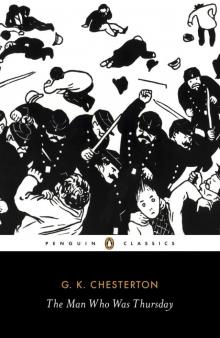 The Man Who Was Thursday: A Nightmare
The Man Who Was Thursday: A Nightmare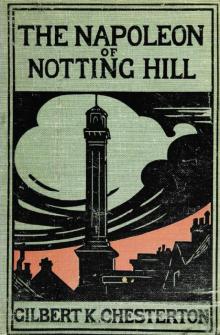 The Napoleon of Notting Hill
The Napoleon of Notting Hill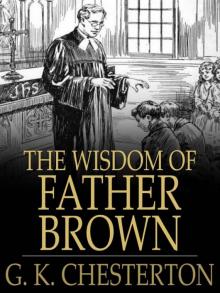 The Wisdom of Father Brown
The Wisdom of Father Brown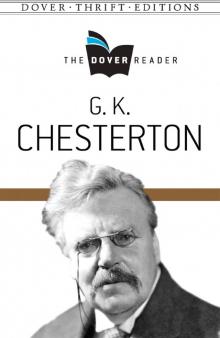 G K Chesterton- The Dover Reader
G K Chesterton- The Dover Reader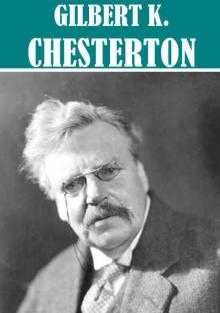 The Essential G. K. Chesterton
The Essential G. K. Chesterton The Trees of Pride
The Trees of Pride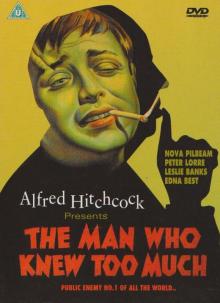 The Man Who Knew Too Much
The Man Who Knew Too Much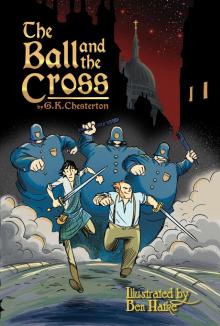 The Ball and the Cross
The Ball and the Cross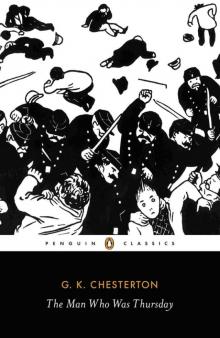 The Man Who Was Thursday (Penguin ed)
The Man Who Was Thursday (Penguin ed)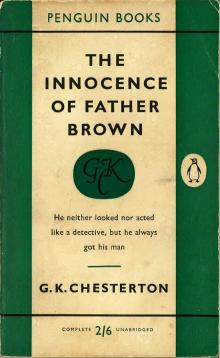 The Innocence of Father Brown
The Innocence of Father Brown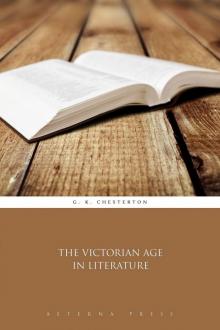 The Victorian Age in Literature
The Victorian Age in Literature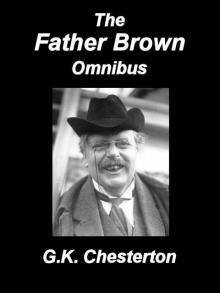 Father Brown Omnibus
Father Brown Omnibus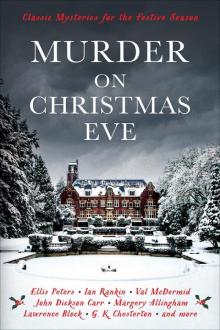 Murder On Christmas Eve
Murder On Christmas Eve The Blue Cross
The Blue Cross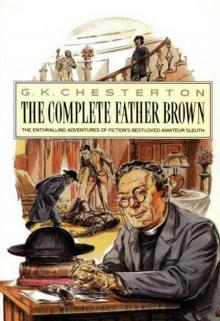 The Complete Father Brown Mysteries Collection
The Complete Father Brown Mysteries Collection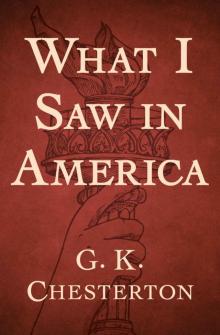 What I Saw in America
What I Saw in America